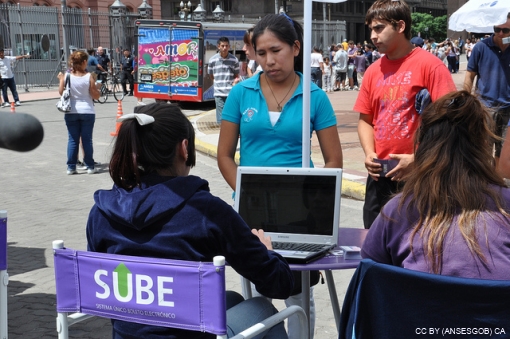Discussions about SUBE and privacy in Argentina
by Digital Rights LAC on June 10, 2013
The SUBE card case in Argentina is a good example of how many policies take over our private lives today without anyone complaining or even noticing.
Por Ramiro Alvarez Ugarte, Asociación por los Derechos Civiles.
Towards the end of 2011, all the inhabitants of the city of Buenos Aires and its suburbs wanted their SUBE, as the public transport card for our city is known. The new technology promised to solve a problem and avoid one in the future. On the one hand, we would avoid the hassle of having to search, find and treasure coins to travel on local buses, since they do not take notes. On the other, the plan was presented as a possibility to avoid potential increases: we were told that the government would create a system of differentiated subsidies by which lower income passengers would have a cheaper ticket.
If you visited Buenos Aires in February 2012, you would have seen the long queues of people who wanted their card. People had to show a national ID, so that the card would be linked to them. This link seemed essential for a differentiated subsidy policy and included an added benefit: enabling to recover the amount on the card in case you lose it. It also recorded all the passenger’s movements and allowed, for instance, to learn the time and subway station you used to take the tube just by entering the card number on the modern website of the Single Electronic Ticket System (SUBE, for its acronym in Spanish).
The SUBE card case in Argentina is a good example of how many policies take over our private lives today without anyone complaining or even noticing. The mechanism works as follows.
Firstly, advances in technology allow things that were not possible before, such as to have a unique and personalized public transport payment system, to record and share biometric data of citizens with thousands of civil servants, or to create huge databases where all types of information –tax, financial, criminal, etc.– is related. Secondly, these policies are presented as a step forward towards increasing security, allowing more intelligent public policy making, improving government efficiency, etc., etc. And, finally, we are assured that the risks these policies pose to our privacy are minor, since the State will use the information collected in a manner consistent with the standards and principles of a democratic state.
In conclusion, we are offered concrete benefits versus hypothetical risks. And that is how these policies, which tend to increasingly diminish citizens’ privacy, move forward without facing much opposition.
However, if we analyze these issues further we will see that the so-called benefits are not such. Let us examine the case of SUBE. It is true that we no longer need coins and traveling is more comfortable. However, we could have an anonymous card as the London Oyster: registering this card is optional. In Argentina it was not even informed that the card could be obtained without the need to show an ID, a possibility that the Association for Civil Rights (ADC) found out thanks to a request for access to public information. And, in practice, identification was expressly requested. Also, differentiated subsidies remained merely hypothetical and just empty promises.
Moreover, the risks were and are very specific: when the system was launched, a person could control his/her partner simply by knowing the SUBE card number. And if our wallet was stolen, the pickpocket would have immediate information about our work routines and where we lived. These risks were partially resolved when, facing claims from advocates for the right to privacy, SUBE administrators established that in order to access the data a password set by the user was required.
Data from SUBE have already been used to prosecute a person in a criminal investigation. Indeed, it allowed to find out that a person accused of stealing on a public bus had actually been in the scene. This actually tells us a lot about this new and convenient card: it is an innovative monitoring system. And it joins the many existing monitoring systems: our phones leaving traces every second, security cameras expanding rapidly, personal cards for the gym and the supermarket, etc., etc. Many will argue that to call the Single Electronic Ticket System a monitoring system is overdoing it. Technically, I believe it is not. But if it were, it at least serves to draw our attention to the future we are creating: it is time we start discussing whether we like it or not.
Ramiro Álvarez es director del Área de Acceso a la Información de ADC.
E-mail: rugarte (at) adc.org.ar






